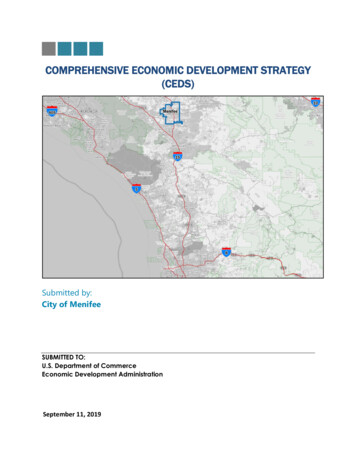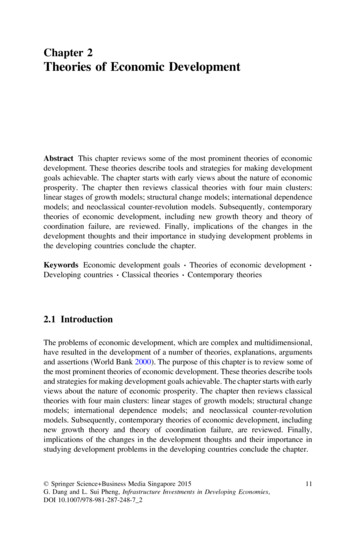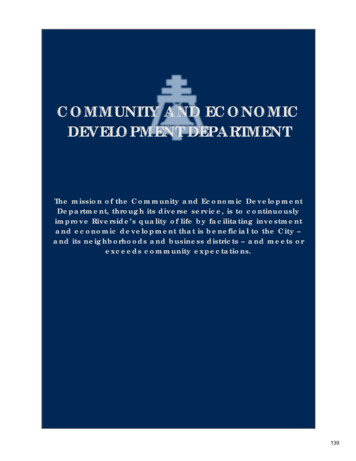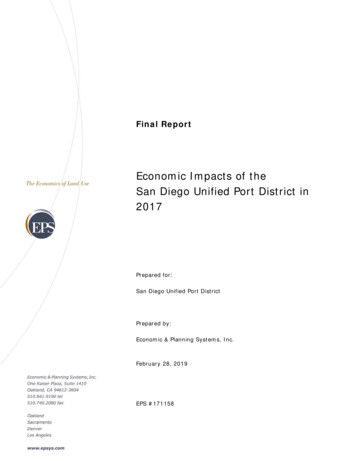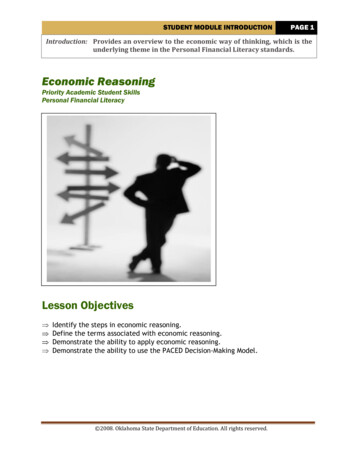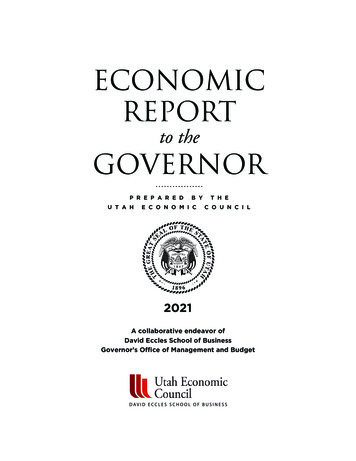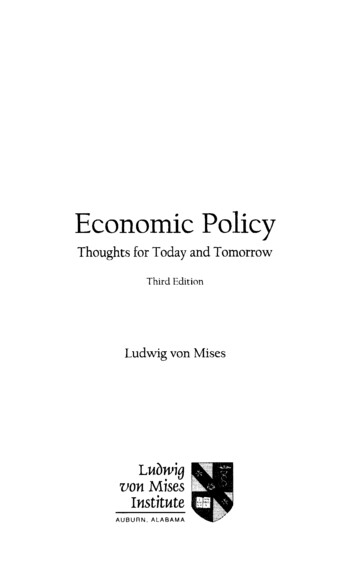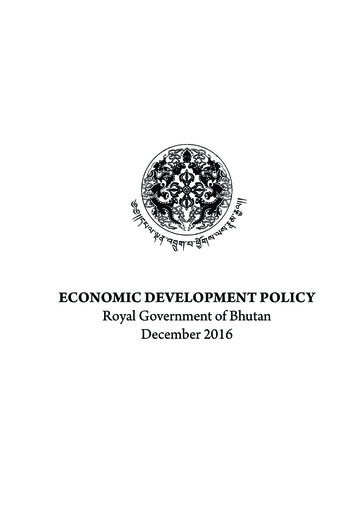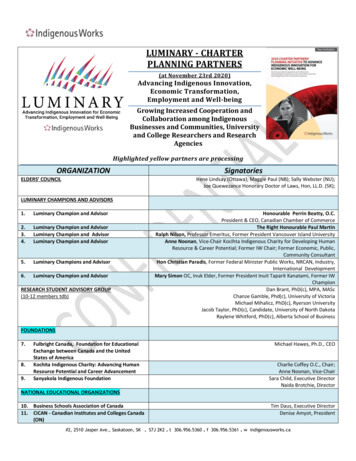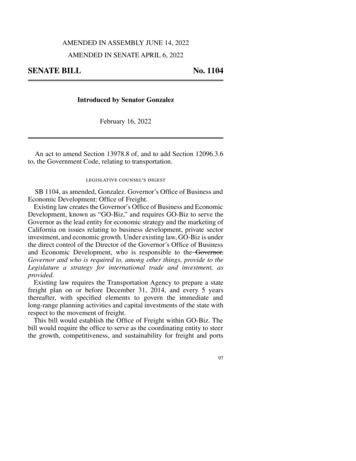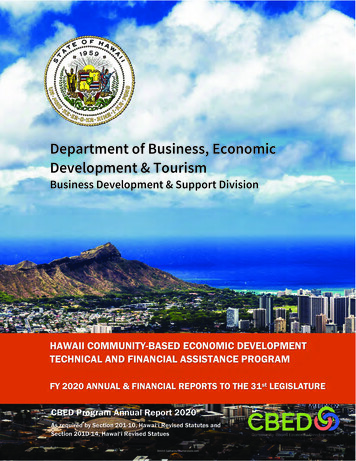
Transcription
Department of Business, EconomicDevelopment & TourismBusiness Development & Support DivisionHAWAII COMMUNITYCOMMUNITY-BASEDBASED ECONOMIC DEVELOPMENTTECHNICAL AND FINANCIAL ASSISTANCE PROGRAMTECFY 2020 ANNUAL & FINANCIAL REPORTS TO THE 31st LEGISLATURECBED Program Annual Report 2020CBEAs required by Section 201-10,201 10, Hawai‘iHawai i RevisedRevise Statutes andSection 201D-14, Hawai‘i Revised StatuesDmitrii Sakharov/Shutterstock.com
INTRODUCTION:The Legislature created a Community-Based Economic Development (CBED) Program in1991 in the Department of Business, Economic Development and Tourism (DBEDT) withAct 111, SLH 1991, codified as Chapter 210D, Hawaii Revised Statutes. As part of thestatute, the CBED Advisory Council and the CBED Revolving Fund were also created.The Council reviews CBED financing requests and makes recommendations on theawarding of loans and grants, subject to the final approval of the DBEDT director. TheCouncil also advises the director on program implementation, and members represent theirisland in liaison with community-based organizations.The Hawaii Community-Based Economic Development Revolving Fund (CBEDRevolving Fund) was established to provide training and capacity-building opportunitiesand invest in community economic development projects that result in measurableeconomic impact. Sources of revenue include repayments of loan principal, loan interest,and interest from the department’s participation in the State’s investment pool. As ofJune 30, 2020, the CBED Revolving Fund had a balance of 603,690.06.CBED MISSION:Through loans, grants and technical assistance the CBED program provides training andcapacity building opportunities to promote, support, and invest in community-baseddevelopment projects that result in measurable economic impact.WHAT WE DO:xLoans to help businessesCBED offers micro-loans usually up to 50,000, to eligible small businesses thatsupport economic development in their communities. We strive to help smallbusinesses to develop viable, sustainable business ventures that serve local needsCBED Program Annual Report 2020-1-
and are compatible with the vision, character and cultural values of theircommunities. The CBED loan program supports a broad range of businesses,including agricultural producers, manufacturing businesses, health/organic foodstores, and hydroponics and aquaculture businesses. CBED currently works withthe Hawaii Department of Agriculture (HDOA) to execute and service loans, andhas just signed an MOU with Feed the Hunger to collaborate on participation loans.We will soon have other Community Development Financial Institutions (CDFI)to support us throughout Hawaii.xTechnical assistance & business resource informationCBED partners with various organizations to target “hard to reach” sectors ofHawaii’s business community to present information on business resources andeducate community-based organizations on how to strengthen their economicdevelopment capabilities or further sustain their revenue generation initiatives. Asan example of this, the CBED Program in collaboration and partnership with theHawaii Farm Bureau provided 10,000 in revolving funds for co-sponsorship andexhibitions for nine (9) separate statewide events covering Hawaii’s four counties,and lasting one to two days each, with a combined total attendance of more than1000 attendees in order to reach more small, rural agricultural producers andprocessors and to develop a more comprehensive outreach program to promoteCBED’s financial (low interest loan) assistance and other DBEDT programs in allfour of Hawaii’s counties.In September 2019, the CBED Program partnered with the Council for NativeHawaiian Advancement (CNHA) to sponsor a one-day event – the Small BusinessResource Fair - at CNHA’s 18th Annual CNHA Convention held at the HawaiiConvention Center on Oahu. More than 1500 attendees for the CNHA Conventionattended the resource fair and received valuable business resource information fromCBED.CBED Program Annual Report 2020-2-
In October 2019, in collaboration with the Waianae Economic DevelopmentCouncil, the CBED staff conducted a workshop at the Kamehameha SchoolsCommunity Learning Center on the Waianae Coast, presenting information for theCBED low interest business loan program, Hawaii’s Enterprise Zone (EZ)Program, and other DBEDT programs such as the HiSTEP and Opportunity ZonePrograms. Attending were 100 small business owners and entrepreneurs from theLeeward Oahu Coast.October 2019 also found the CBED Program as an exhibitor for the two-day “Ag2019 – Hawaii Agriculture Conference” held at the Hawaii Convention Center.Information on all DBEDT and CBED Programs were distributed to more than 200attendees.In response to the COVID-19 pandemic, from April through June, 2020 the CBEDProgram assisted the Small Business Administration (SBA) with promoting andadvising businesses on the Paycheck Protection Program (PPP) and the EconomicInjury Disaster Loans (EIDL). CBED also re-directed a current contract with theHawaii Community Reinvestment Corporation (HCRC) to provide technicalassistance to nonprofits to access SBA EIDL and PPP loans. HCRC consulted withnonprofits to understand their immediate (three to six months out) cash flow needsand the Federal resources available. In addition, HCRC held several periodicwebinars to reach a broader audience.The total number of CBO’s, cooperatives, and small businesses assisted in FY 2020numbered to more than 2,500 through the collaborative outreach efforts betweenthe CBED Program staff and community-based organizations such as the WaianaeEconomic Development Council, Hawaii (Statewide) Farm Bureau and individualcounty farm bureaus, and the Council for Native Hawaiian Advancement (CNHA).Co-sponsorship of the annual Native Hawaiian Small Business Resources Fair heldin conjunction with the Council for Native Hawaiian Advancement’s (CNHA)CBED Program Annual Report 2020-3-
Annual Convention at the Hawaii Convention Center on Oahu, provided businesstraining, informational workshops and one-on-one assistance between more than20 business resource agencies and 1000 small business owners and entrepreneurs.The revolving fund, technical assistance, and capacity-building program initiativeswill continue to be a crucial resource for Hawaii’s entrepreneurs and communitybased organizations to create jobs, implement or expand their businesses, anddevelop sustainable revenue generating initiatives. Community-based economicdevelopment is a bottom-up approach and can play an important role in the State’slarger economic development strategy. As the assistance from the CBED Programhelps rejuvenate the entrepreneurial and community economic developmentsectors, the CBED Program itself will also be rejuvenated.CBED strategies and practices can play a valuable part in an overall economicdevelopment strategy for Hawaii. Specifically, CBED is a bottom-up economicdevelopment initiative that can supplement more centralized or top-downapproaches. This bottom-up approach begins by sourcing economic developmentopportunities from local communities themselves, which can be “demographiccommunities” or “communities of interest.” These opportunities, which usuallybecome projects, not only have community-backing, but usually have some formof community control. The CBED approach can help build new infrastructure fora more sustainable Hawaii economy, based on decentralization, partnerships,human resource development, and innovation.The foundation created by community-based economic development leads to longterm capacity-building for local communities and residents and provides backwardlinkages to ancillary firms to sustain and expand the main sectors of the economy.Hawaii’s economy is in need of true diversification. CBED is a practical way toachieve a true restructuring of Hawaii’s economy. As the old economic enginesbecome obsolete, the state must look for new alternatives. CBED is a key strategyCBED Program Annual Report 2020-4-
for not leaving behind the lower income urban and rural communities in the Stateof Hawaii.HOW WE DO OUR WORK:The CBED Program is guided by an Advisory Council comprised of community v/business/cbed/advisory-council-members/). An annual meeting is held to discuss results, decide on current activities and toadjust strategy as needed.NEW LOANS IN FY 2020:In March and April of 2020, the CBED Advisory Council recommended approval for asecond CBED co-loan with the HDOA’s Loan Division (ALD) of 60,000 to HawaiianAgricultural Products, LLC, dba Hawaiian Shochu Company. An initial CBED loan of 25,000 matched by an additional 25,000 of ALD funds to purchase a new USAmanufactured boiler was paid in full prior to the approval of the second CBED loan of 60,000. Hawaiian Agricultural Products’ first CBED loan balance was paid for by theALD. In April 2020, the DBEDT Director approved a Community-Based EconomicDevelopment Revolving Fund second loan of 60,000 to Hawaiian Agricultural ProductsLLC, dba Hawaiian Shochu Company, to be matched by an additional 60,000 loan fromALD. CBED Revolving loan funds were used primarily for the purchase and installationof additional brewing and holding equipment needed to expand production and distributionof shochu made at the company’s distillery.Hawaiian Agricultural Products LLC, dba Hawaiian Shochu Company is a limitedliability company established in March 2010 by Ken Hirata, its sole owner/member. Thecompany was created to develop and produce shochu, a distilled alcoholic beverage thatis native to Japan and made primarily from sweet potatoes and rice.CBED Program Annual Report 2020-5-
The Hawaii CBED Revolving Fund was established to provide training and capacitybuilding opportunities and invest in community economic development projects that resultin measurable economic impact. Sources of revenue include repayments of loan principal,loan interest, “Transfers” of revenue collections from other closed DBEDT loan programs(i.e., Capital Loan Program, Small & Large Fishing Vessel Loan Programs), and fees fromcommunity conferences and other events sponsored through the CBED Program.CBED Revolving Fund AccountBeginning balance as of July 1, 2019Revenues for fiscal year:Loan Interest PaymentsLoan Principal PaymentsInvestment Pool EarningsTransfersExpenditures for fiscal yearEncumbrancesBalance as of June 30, 2020 448,087 1,273 20,874 327,814( 134,100)( 35,129) 628,819The CBED Revolving Fund may be used for loans, grants and technical assistance. TheCBED Program focused most its efforts in FY20 on outreach and technical assistancegrants to help grow small businesses and non-profits seeking to diversify their fundingstreams with recurring revenue-generating projects, providing assistance for accessingFederal financial assistance for COVID-19, and outreach to promote services and financialassistance available through DBEDT.CBED OPPORTUNITY ZONES PROGRAM:The recently passed Federal Tax Cuts and Jobs Act of 2017 authorized a communityeconomic development program called the Opportunity Zones Program. This initiativeprovides incentives for investors to re-invest realized capital gains into OpportunityFunds in exchange for temporary tax deferral and other benefits. The Opportunity Fundsare then used to provide investment capital in certain low-income communities, i.e.,Opportunity Zones. It is hoped that this program will lead to neighborhood and businessCBED Program Annual Report 2020-6-
district re-vitalization as well as encourage entrepreneurship in the Opportunity Zones.The benefits to communities and investors include:Benefits to CommunitiesxNew or upgraded workforce and affordable housingxNew or expanded businesses employing more workers at livable hoodsBenefits to InvestorsxA temporary tax deferral for capital gains reinvested in an OpportunityFund. The deferred gain must be recognized on the earlier of the date onwhich the Opportunity Zone investment is sold or December 31, 2026.xA step-up in basis for capital gains reinvested in an Opportunity Fund. Thebasis of the original investment is increased by 10% if the investment in thequalified Opportunity Zone fund is held by the taxpayer for at least 5 years,and by an additional 5% if held for at least 7 years, excluding up to 15% ofthe original gain from taxation.xA permanent exclusion from taxable income of capital gains from the saleor exchange of an investment in a qualified Opportunity Zone Fund if theinvestment is held for at least 10 years. (Note: this exclusion applies to thegains accrued from an investment in an Opportunity Fund, not the originalgains).Additional IncentivesAll the Opportunity Zones in Hawaii overlay with other economic developmentinitiatives such as New Market Tax Credits, Enterprise Zones and Transit OrientDevelopment (TOD) Zones. There are also many other non-census tract-basedprograms that can be applied such as Low-Income Housing Tax Credits(LIHTC). Additionally, there may be synergies between investors and theirmissions and the major property holders and businesses in an Opportunity Zone.CBED Program Annual Report 2020-7-
25 Census Tracts Designated as Opportunity ZonesHawaii designated 25 census tracts as Opportunity Zones as part of the new federalcommunity development program established by Congress in the Tax Cuts and JobsAct of 2017 to encourage long-term investments in low-income urban and ruralcommunities nationwide. Its stated purpose is to encourage entrepreneurship andexpansion capital for economically distressed areas of the country.From left to right: Mark Bratton Colliers International, Brent Parker, Novogradac & Company LLP and MarcSchultz, Snell & Wilmer at Update on Understanding Opportunity Zones in Hawaii.Update on Understanding Opportunity Zones in Hawaii SeminarDBEDT views the Opportunity Zone Initiative as an economic development tool(tax shelter) that uses Federal tax incentives to direct investment capital to underserved, low income areas and targeted communities defined as Opportunity Zones.On Oct 17, 2019 the CBED Program hosted an event, Update on UnderstandingOpportunity Zones, co-sponsored by the Hawaii Society of Certified PublicAccountants (HSCPA) and the Hawaii Community Reinvestment Corporation(HCRC). Around 150 people attended the event, which featured keynote speakers,Brent Parker, Principal, Novogradac & Company LLP and Marc Schultz, Partner,CBED Program Annual Report 2020-8-
Snell & Wilmer. Follow up Opportunity Zone workshops were also organized onOahu as well as Kauai, Maui and Hawaii Island. More information on Hawaii’sOpportunity Zones is available at: https://invest.hawaii.gov/oz/.CBED Program Annual Report 2020-9-
CBED OUTREACH 2019:Event/VenueDate(s)ParticipantsKauai County FarmBureau Annual Meeting7/21/2019170Hawaii Coffee Association’s24th Annual ConferenceAla Moana Hotel, Honolulu7/25-27/ 2019150Whitmore Village AgriculturalBusiness WorkshopPineapple Crate, Wahiawa, Oahu7/31/2019319/21-25/20191500Maui Farm Bureau Annual MeetingKula, Maui9/25/2019150AG2019-Hawaii Agriculture ConferenceHawaii Convention Center10/15-16/2019400Molokai Small Business FairMaui College-Molokai Campus10/18/201950Waianae Small Business SymposiumWaianae District Park10/19/201950Council for Native HawaiianAdvancement (CNHA) 18th AnnualNative Hawaiian ConventionHawaii Convention CenterHawaii Farm Bureau: 72nd Annual Convention 10/29-30/2019The Royal Lahaina Resort, MauiHawaii Cattlemen’s Annual Meeting &ConventionWaikoloa Beach Marriott Resort & Spa,Kona, Hawaii11/15-16/2019CBED Program Annual Report 2020-10-90200
CBED Program Annual Report 2020-11-
HAWAII SMALL BUSINESS FAIRS:Due to the COVID-19 pandemic, the Hawaii Small Business Fair originally scheduled tobe held at the UH’s Leeward Community College, for the first quarter of 2020 wascanceled. The CBED Program hopes to restart this very successful event later in 2021.Prior annual “Small Business Fairs” have provided financial and informational resourcesto more than 1000 community-based organizations, cooperatives, and small businesses.Co-sponsorship of the Hawaii Small Business Fair with and at the University of Hawaii’sLeeward Community College has proven a successful partnership.In September 2019, the CBED Program sponsored and organized the Business ResourceOne-Day Fair at the Hawaii Convention Center in conjunction with the Council for NativeHawaiian Advancement’s 17th Annual Convention attended by 1500 conventionparticipants. The CNHA Convention is Hawaii’s largest Native Hawaiian event withworkshops, speakers and attendees from international, national, and state regions.Attendees of the fairs and workshops are offered valuable information on a wide range ofbusiness topics that included, but not limited to: Copyrights, Patents & Trademarks,Financing Your Business, Professional Networking, and Tax Tips for Small Business, andmuch more. Members of the Hawaii Small Business Development Center, Patsy T. MinkCenter for Business & Leadership and other professionals are on hand to provide smallbusiness owners and entrepreneurs with free one-on-one business counseling. A widerange of up to thirty-five (35) Federal, State and private agencies, including major Hawaiifinancial institutions are also on hand to provide business resources and information.Comments provided by attendees are consistently positive:x“I was impressed with the turnout and the quality of the guest speakers. I reallylearned a lot from all three workshops I attended.”x“Great service for the community.”x“Excellent workshops, excellent vendors. Thank you!!”CBED Program Annual Report 2020-12-
x“Very valuable information.”x“It was great! I look forward to the next fair.”These free workshops and exhibits provide an opportunity for small business owners andfuture business owners to learn to grow or start their own business.CBED - A CONTINUING STRATEGY:Community-based economic development is specifically a strategy for addressing theneeds of low–income communities. CBED has been implemented in the United States formore than 40 years, and in Hawaii for more than 25 years. As the dialogue aboutincorporating community vision and values into present day Hawaii continues, CBEDstands out as an effective strategy to achieve those goals by empowering the community,increasing capacity, and conserving local resources. CBED is a proven strategy that differsfrom traditional economic development because it emphasizes community reinvestmentand local economic opportunities. It is a complete process that addresses a community’seconomic and social needs. CBED strategies help maintain Hawaii’s cherished quality oflife for its residents over the long term, while Community-Based Organizations (CBOs)provide social services and ecosystem services that make a locality attractive to new,appropriate investment and economic development. In the spirit of creating “PublicPrivate Partnerships,” the CBED Program has focused on partnering with other state,federal and private agencies to help build the capacity of small businesses, entrepreneurs,and CBOs through training workshops, conferences, conventions, and other events.CBED TOOLS/RESOURCES/STRATEGIES/PROGRAM ACTIVITIES:In implementing the CBED program, chapter 210D, Hawaii Revised Statutes, allowsDBEDT to make grants, loans and offer technical assistance.The Council’s guidance on how to use these tools were as follows:CBED Program Annual Report 2020-13-
Grants should be used for: Non-profit organizations determined to be exempt from federal income taxby the IRS; Technical Assistance for grant writing – “Grantsmanship Center” andother resource centers for grant writing; Train-the–trainer programs – i.e., HANO; Hawaii Community Foundation;Hawaii County; Capacity-building – building a community’s financial expertise; Development of business mentorship programs; The Council suggested that grants be 10% of the CBED budget with 90%for loans and technical assistance, e.g. 500,000 budget would allocate 50,000 to grants.Loans: CBED could use EZ program as “filter” for guidance – geographic targetareas such as Enterprise Zones; Consider start-ups/business growth/entrepreneurship/youth training; Targets for loans may include for-profits, social enterprises andcooperatives that produce and/or utilize community resources/products; Consideration towards partnerships to leverage CBED funds:- Department of Agriculture- Small Business Administration (SBA)- Maui Economic Opportunity (MEO)- Pacific Gateway- Office of Hawaiian Affairs (OHA)- Contact counties to identify other organizations providing micro-loans; Council agreed that loans should on average be 25,000 but can go as highas 100,000 depending on the project and partner(s).CBED Program Annual Report 2020-14-
Technical Assistance for Consideration: One Stop Centers/CBED Resources; Web portal site for Hawaii community-based economic development; Financial Information/Training; Business Resource Centers – i.e., SBDC, UH & Community Colleges;Innovation Centers Accelerators – Designed to assist community-based non-profits that havean economic impact mission. Seek to diversify non-profits’ fundingstreams through the development of projects that generate recurringunrestricted revenue.Outcomes/metrics-Measuring SuccessThe Advisory Council agreed on the following tracking metrics that could be usedto measure success: Jobs created Jobs retained Earnings Training hours Revenue increases Local sourcing of inputs (multiplier effect) Satisfaction by program Social impact – use same metrics as partner non-profit organization New businesses createdCBED Program Annual Report 2020-15-
CBED ADVISORY COUNCIL:The CBED Advisory Council now consists of 10 members. The Director of DBEDT, theChairperson of the Board of Agriculture, and the Chairperson of the Office of HawaiianAffairs, or their respective designees, are ex-officio members. The Governor appoints theremaining seven members, representing all counties plus one member who has specificcommercial finance experience.The Council reviews CBED financing requests and makes recommendations on theawarding of loans and grants, subject to the final approval of the DBEDT director. TheCouncil also advises the director on program implementation, and members represent theirisland in liaison with community-based organizations.Council members bring a myriad of skills sets to the Department and the CBED Program.Skill sets of current CBED Advisory Council Members include, but are not limited to:Strategic Communications, Program Management, Community Outreach, ProjectManagement, Government, Strategic Planning, Public Speaking, Nonprofits, Leadership,Business Strategy/Business Analytics, Financial Modeling, Process Improvement,Finance, Risk Management, Public Policy, Grants, Public Administration, CustomerService, Legislative Relations, and Policy Analysis.During strategic planning sessions, the Council has voiced its agreement and understandingof the importance of partnerships and emphasized the need to leverage and obtainadditional CBED funding and seek loan servicing services to address the fact that DBEDTdoes not have a loan officer to service loans made through the CBED Revolving Fund.The CBED Advisory Council listed the following as desired program goals:Create jobs and opportunities (such as new businesses) in economically disadvantagedareas and empower communities to control their own economic destiny byCBED Program Annual Report 2020-16-
targeting communities in disadvantaged areas of the state such as those located in enterprisezones (EZ):1) Supporting start-ups, business expansions, social enterprises, co-ops, andentrepreneurship;2) Considering youth training and mentorship/apprentice programs in projects;3) Facilitating sustainability among communities and organizations so they cancontinue operating;4) Including multiple communities – by demographic, by island;5) Leveraging program funds through partnerships;6) Dovetailing CBED program with EZ and other state, county, federal, privateprograms;7) Seeking ways CBED can uniquely impact, not replicate, what others aredoing.The Council also noted that while specific industries should not be targeted or givenpreference, the CBED program should consider which industries will create the most jobsand jobs requiring skilled workers.CURRENT CBED ADVISORY COUNCIL MEMBERS:Mr. Matthew K. Loke, Representative for Chair Phyllis Shimabukuro-GeiserDepartment of Agriculture (DOA)Mr. James Patterson, Representative for Chair Colette Y. MachadoOffice of Hawaiian Affairs (OHA)CBED Program Annual Report 2020-17-
Mr. Dennis T. Ling, Representative for Director Mike McCartneyDeprtment of Business, Economic Development & Tourism (DBEDT)Ms. Rachel James, Chair – CBED Advisory Council (Oahu)Ms. Elvira Lo, CBED Advisory Council Member (Oahu)Mr. Kaleokalani Kuroda, CBED Advisory Council Member (Oahu-Financial)Ms. JoAnn Inamasu, CBED Advisory Council Member (Maui)CBED Program Annual Report 2020-18-
Ms. Jane Horike, CBED Advisory Council Member (Hawaii Island)Mr. Ernest Matsumura, CBED Advisory Council Member (Hawaii Island)VACANT, CBED Advisory Council Member (Maui)VACANT, CBED Advisory Council Member (Kauai)Mr. Mark J. Ritchie, DBEDTBranch Chief – Business Support BranchCBED StaffCBED Program Annual Report 2020-19-
Mr. Wayne Thom, DBEDTCommunity Economic Development (CED) ManagerCBED StaffCONCLUSION:Traditional top-down economic development is focused on business and profit, but manyof Hawaii’s rural and disadvantaged urban communities and residents do not reap thebenefits or resist a centralized approach to economic development. CBED is a positiveprogram that empowers the community, strengthens the knowledge base and providesaccess to the resources to expand economic and social development. CBED supplies theinfrastructure for long-term self-sufficiency, entrepreneurial opportunities, jobs, andrevenue for Hawaii’s local communities. CBED is a bottom-up approach and plays animportant role in the State’s overall economic development strategy. An expanded fundcommitment to the Statewide CBED Program serves to make Hawaii stronger byempowering communities and increasing self-sufficiency and economic diversification.For more information on DBEDT’s CBED Program go to:https://invest.hawaii.gov/business/cbed/ .CBED Program Annual Report 2020-20-
second CBED co-loan with the HDOA's Loan Division (ALD) of 60,000 to Hawaiian Agricultural Products, LLC, dba Hawaiian Shochu Company. An initial CBED loan of 25,000 matched by an additional 25,000 of ALD funds to purchase a new USA manufactured boiler was paid in full prior to the approval of the second CBED loan of 60,000.
